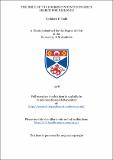The role of the correspondences in Gide's search for dialogue
Abstract
The aims of this thesis are to show that dialogue in Gide's correspondences is of primordial importance in helping Gide to establish and develop his artistic position and to provide adequate proof of the fact that artistic discussion in the correspondences hears fruit in Gide's literary work. Before undertaking this task, certain preliminary steps are taken in my Introduction and in Chapter One. The former contains a definition of dialogue which stresses the fact that, for Gide, it is essentially artistically orientated and most useful when it entails opposition. My choice of Gide's correspondences with Paul Valéry, Francis Jammes, Paul Claudel and Roger Martin du Gard is explained and justified. These correspondences are representative of Gide's development as a "being of dialogue" and cover Gide's literary career chronologically. In Chapter One, Gide's attitude to correspondence is explored in order to prove that the correspondences deserve closer study since they held an important and specific place in Gide's life, being intended for publication. The possible reasons for this are investigated and the conclusion is drawn that Gide wanted his public to participate in the moral and artistic dialogue which takes place in the most important of his correspondences. The purpose of such a study was to show that my decision to deal only with dialogue upon art was not an arbitrary one. Chapters Two, Three and Four concern the course of dialogue in the chosen correspondences. Chapter Two snows now dialogue with Valery helps Gide to build the foundations of his artistic position, Chapter Three now dialogue with Jammes and Claudel encourages Gide to establish and strengthen it, while Chapter Pour is witness to the fact that dialogue with Martin du Gard is Gide's insurance against artistic complacency. Chapter Five studies the relationship between Gide's correspondences and certain of his works ( Le Traité du Narcisse, Le Retour de l'Enfant prodigue and Les Faux- Monnayeurs ). Images and artistic preoccupations which appear in the correspondences studied are given parallel expression in Gide's literature. In addition, the nature of Gide's dialogue with his correspondents is also apparent in the manner in which he presents ideas in his literature. Chapter Five is intended as proof of my conclusion not only that dialogue in Gide's correspondences is, as much as his Journal, a bridge to his work but also that, for a fuller understanding of the artistic reflection which is the fundamental basis of Gide's work, his correspondences are essential reading.
Type
Thesis, PhD Doctor of Philosophy
Collections
Items in the St Andrews Research Repository are protected by copyright, with all rights reserved, unless otherwise indicated.

